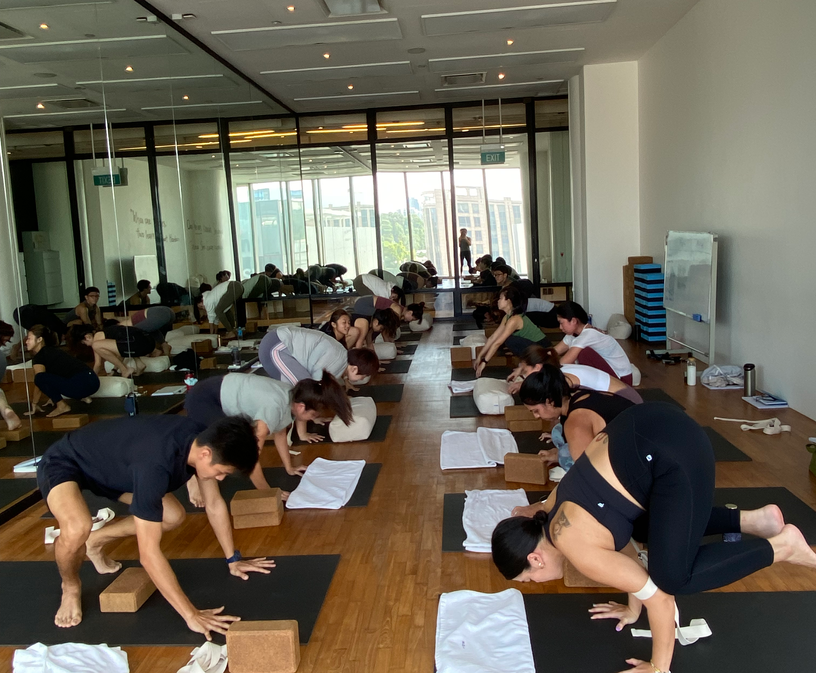LIVING YOGA: 200-HOUR HATHA YOGA TEACHER TRAINING 2026
22-28 June immersion in Bali + every weekend from 4 July to 16 August in Singapore (8am-6:30pm)
At the heart of Yoga is connection — to the practice, to the community, to yourself. Before we can share the gift of Yoga, we must first do the inner work. This training asks that you be ready to do just that — to shed restrictive beliefs, to dare to be vulnerable and, most importantly, to dare to be yourself.
This training program brings a plethora of essential pillars to the table — Yoga philosophy, functional anatomy, sequencing, asana modifications and Ayurveda, all of which we will study within a framework of daily pranayama, asana and meditation practice.
I have renamed the training from Vinyasa to Hatha Yoga teacher training, but please note that does not mean that we are learning only the static, slower form of postural practice that the term 'Hatha Yoga' is often marketed or perceived to be in studio class descriptions; in fact, Hatha Yoga is the umbrella term for all physical Yoga practices and styles.
Our focus in the training is vinyasa krama, in which breath plays an unequivocal role in facilitating entries and exits through intelligently sequenced postures, and we will also dive deep into the philsophy of Yoga and Vedanta (both systems stem from the Vedas, and are therefore very complimentary). The curriculum guarantees you a solid starting foundation to confidently teach a breath-based approach to Yoga (that includes vinyasa, as well as the modern intrepretation of Hatha Yoga), but it is also so much more. Our time together creates an experiential learning environment for you to explore, debate and discover your own truths about your body and your practice. From that space, the training will support you to step into your authentic voice, so the Yoga you share is relatable, honest and real.
Regular circle sharing and introspective discussions are part of the coursework, so participants should be open to a degree of vulnerability and honesty. I also teach based on energetic, intuitive alignment, which may be significantly different from what many practitioners are used to. It is recommended that you take at least a few classes with me (online or in-person) to familiarise yourself with my teaching style before committing to this training.
The training begins with a compulsory 7-day immersion in Bali (22-28 June 2026), during which the basics of Hatha Yoga and Vedanta will be laid. This is a necessary part of the teacher training, and your training fee covers the immersion but not your personal expenses (accommodation, flight tickets, airport transfers and dinners). The Singapore training is held every weekend at my Towner Road shala (2-minute-walk from Boon Keng MRT station).
-
Module I: Immersion in Bali
A gathering of sincere practitioners (who may or may not be joining the YTT component in Singapore), this immersion is held in a retreat centre in the heart of Ubud, where I spent many foundational years of my Yoga studies. For a week, we will remove ourselves from the routine of daily living, so as to drop into the rhythm of unobstructed practice and studentship. Together, we will create a conducive container in which we will explore the complementary systems of Yoga and Vedanta. I will be supported by my Vedanta teacher, as well as my wonderful teacher friends based in Ubud, including my first teacher trainer Emily Kuser. The aim of this module is to offer a deeper, contemplative viewpoint of the practice, alongside a grounded approach to weave and integrate these insights into modern living, both on and off the mat.
Module II: The body
In this module, we will further explore translating the wisdom we have gathered during the residential immersion into the most tangible limb of Yoga — our physical practice. Our bodies become the tools through which we experience, explore and redefine our asana practice. We will break down common postures and their modifications, and learn to harness the use of both manual and verbal cues in assists. Functional anatomy sessions play an integral role in this module. These highly engaging sessions bring the practice of asana to life, teaching you healthy and sustainable movement patterns, while empowering you to work with your body (and others’) in mindful, inclusive and efficient ways. By shining the spotlight on skeletal variations, one of our key takeaways is to learn to adapt the postures to suit our bodies; not contort our bodies to fit pre-conceived shapes. This course does not focus on teaching advanced asana, but you are free to express your own variations during our daily practice.
Module III: The art of teaching
In this module, we prepare to take the seat of a teacher, discovering our unique gifts and authentic voice. We will explore the language of Yoga—tone, clarity, rhythm and pace; learn intelligent sequencing; and dive deep into the art of theming, drawing on Yoga philosophy and our life experiences as inspiration for building impactful class templates. We will learn how to set up a safe, trauma-informed learning space, how to manage surprise scenarios, and refine our teaching through regular practise teaching sessions and lots of feedback.
Training fee
S$3,800 (early bird until 22 Jan 2026)
+$S$500 thereafter
Fee includes non-residential Bali immersion fee, and all training hours in Singapore
Training dates
22-28 June (Bali immersion)
4 & 5 July
11 & 12 July
18 & 19 July
25 & 26 July
1 & 2 August
8 & 9 August
15 & 16 August
Sample Bali immersion schedule
7:30-8am: Noble silence. Quiet contemplation, reflection, journalling
8-10am: Morning practice
10-11am: Breakfast
11am-1pm: Vedanta lecture
1-2:30: Lunch break
2:30-4:30pm: Classroom session (lecture, workshop etc.)
4:30-6:30pm: Evening practice
Sample Singapore training schedule
8-8:30am: Noble silence. Quiet contemplation, reflection, journalling
8:30-9am: Reflections, unpacking earlier learnings
9-9:30am: Break
9:30am-1:30pm: Lecture/Workshop/Teaching methodology/Teaching labs
1:30-2:30pm: Lunch
2:30-4:30pm: Lecture/Workshop/Teaching methodology/Teaching labs
4:30-6:15pm: Practice (asana, pranayama, meditation)
6:15-6:30: Reflections, questions, closing



























